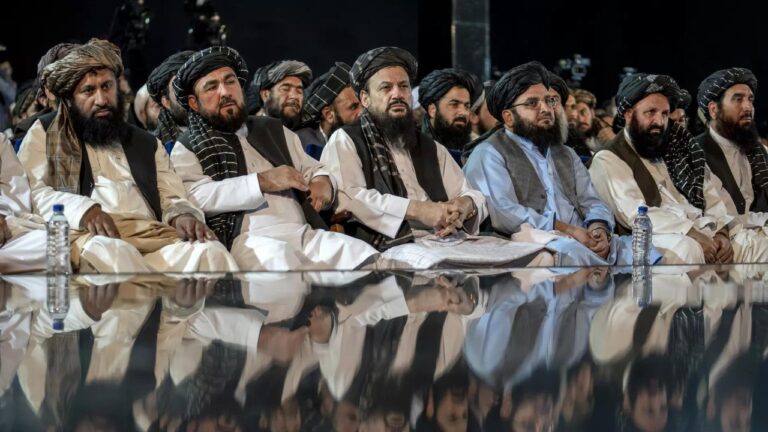ISLAMABAD: The Afghan Taliban are intensifying efforts to open up various channels of communication with regional and neighbouring countries as relations with Pakistan continue to deteriorate and turn hostile following the US withdrawal from Afghanistan.
Taliban leaders have also reached out to Iran, China, Russia and the UAE, as well as to countries in West Asia and beyond, in addition to participating in the World Economic Forum in St. Petersburg, Russia.
Recently, Abu Dhabi Emir Sheikh Mohammed bin Zayed Al Nahyan met in Kabul with Taliban Interior Minister Sirajuddin Haqqani, who also heads the Haqqani Network, a powerful faction within the Taliban.
Kabul approached the Indian government through Deputy Foreign Minister Sher Muhammad Abbas Stanikzai soon after the formation of the Afghan interim government in 2021. Letters between the two sides opened channels of communication, leading to formal contacts.
On the contrary, relations between Islamabad and Kabul are becoming more hostile with each passing day. Kabul’s refusal to curb the alleged activities of Tehreek-i-Taliban Pakistan (TTP) militants in the country has severely damaged the relationship. Travel restrictions on Afghan nationals and the expulsion of Afghan refugees from Pakistan have further worsened relations.
Experts say Kabul’s diplomatic efforts will be unlikely to bear fruit unless they focus on resolving issues such as human rights, women’s education and employment.
Noor Rehman Sherzad, a Sweden-based Afghanistan analyst, said the Taliban government has not formulated any foreign policy since coming to power in August 2021.
According to him, a government that is not officially recognised by any country has no diplomatic or legal status in relations with the international community and neighboring countries.
“Taliban regime representatives are gradually realising that the policies of the past three years have not brought any significant results,” Sherzad said, adding that officials from the international community and other countries in the region were also visiting Afghanistan and conveying their security concerns to Kabul.
Commenting on the Taliban’s accelerated diplomatic efforts, Afghanistan expert Arif Yousafzai told TOI that such contacts would help build mutual intelligence ties. He said the Taliban are making a lot of claims on their own but are not doing what the international community is asking them to do. “They have not changed their behaviour at all,” he added.
Afghan journalist Abdul Haq Omari believes the Taliban now faces two challenges to staying in power: establishing formal ties with other countries and maintaining the religious narrative at home that they have been fighting for for 20 years.
“The survival of the religious narrative is important to the Taliban because their sudden withdrawal could lead to the Taliban’s rival groups in Afghanistan, the Islamic State and Daesh-Khorasan, strengthening their anti-Taliban narratives,” he added.
Taliban leaders have also reached out to Iran, China, Russia and the UAE, as well as to countries in West Asia and beyond, in addition to participating in the World Economic Forum in St. Petersburg, Russia.
Recently, Abu Dhabi Emir Sheikh Mohammed bin Zayed Al Nahyan met in Kabul with Taliban Interior Minister Sirajuddin Haqqani, who also heads the Haqqani Network, a powerful faction within the Taliban.
Kabul approached the Indian government through Deputy Foreign Minister Sher Muhammad Abbas Stanikzai soon after the formation of the Afghan interim government in 2021. Letters between the two sides opened channels of communication, leading to formal contacts.
On the contrary, relations between Islamabad and Kabul are becoming more hostile with each passing day. Kabul’s refusal to curb the alleged activities of Tehreek-i-Taliban Pakistan (TTP) militants in the country has severely damaged the relationship. Travel restrictions on Afghan nationals and the expulsion of Afghan refugees from Pakistan have further worsened relations.
Experts say Kabul’s diplomatic efforts will be unlikely to bear fruit unless they focus on resolving issues such as human rights, women’s education and employment.
Noor Rehman Sherzad, a Sweden-based Afghanistan analyst, said the Taliban government has not formulated any foreign policy since coming to power in August 2021.
According to him, a government that is not officially recognised by any country has no diplomatic or legal status in relations with the international community and neighboring countries.
“Taliban regime representatives are gradually realising that the policies of the past three years have not brought any significant results,” Sherzad said, adding that officials from the international community and other countries in the region were also visiting Afghanistan and conveying their security concerns to Kabul.
Commenting on the Taliban’s accelerated diplomatic efforts, Afghanistan expert Arif Yousafzai told TOI that such contacts would help build mutual intelligence ties. He said the Taliban are making a lot of claims on their own but are not doing what the international community is asking them to do. “They have not changed their behaviour at all,” he added.
Afghan journalist Abdul Haq Omari believes the Taliban now faces two challenges to staying in power: establishing formal ties with other countries and maintaining the religious narrative at home that they have been fighting for for 20 years.
“The survival of the religious narrative is important to the Taliban because their sudden withdrawal could lead to the Taliban’s rival groups in Afghanistan, the Islamic State and Daesh-Khorasan, strengthening their anti-Taliban narratives,” he added.

